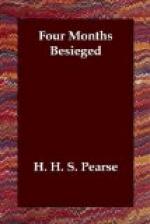Looking at the little ones as they trooped through the hall, in their white finery, Sir George said he had no idea that so many children remained in Ladysmith, and perhaps at that moment his heart was heavy with a deeper sense of the responsibility thrust upon him. But fortunately we have been spared the worst horrors of a bombardment. Though Boer gunners have never hesitated, but rather preferred, to turn their fire on the open town, with a probability of hitting some house in which were women and children, none of the latter, and only two of the former, have been hit through the whole siege. Mrs. Kennedy, to whose narrow escape I have already referred, suffered so little bodily injury or nerve shock that she was present with her children at the Christmas tree entertainment, and took the congratulations of her friends quite coolly. After the children had gone home trees and trappings were dismantled, and the hall cleared for dancing, which the young people of Ladysmith and a few subalterns off duty kept up with much spirit until near midnight. In days to come we may look back to our Christmas under siege in Ladysmith, and think that after all we had not a very bad time. At this moment, however, there is probably nobody outside who envies our lot, or grudges us any enjoyment we may manage to get out of it. Soldiers, at any rate, deserve every chance of relaxation that can be found for them. There are several regiments of this force that have been practically on outpost duty since the investment began, often exposed to rain-storms during the day, because they could not pitch even shelter tents without drawing the enemy’s fire on them. When the honours for this campaign come to be distributed I hope the services of these regiments will not be ignored.
Some Boxing Day sports had to be postponed for a more convenient opportunity, because shells were falling too thick about the camp, and since then the Boer guns have been so busy that men find occupation enough in fatigue duties at strengthening defensive works without thinking about amusements. The bombardment that day began with the first flush of roseate sunrise—when our enemies brought some smokeless guns to bear on us from new positions—and went on steadily for hours until “Puffing Billy” of Bulwaan left off shelling in this direction, and turned to fire several shells eastward. Rumour, as usual, was equal to the occasion, circulating stories that Sir Charles Warren’s patrols were known to be moving that way. These inventions are worth nothing unless the names of corps or their commanding officers can be given, so their originators always take care to give such realistic touches. They give you “the lie circumstantial” or none at all. Possibly there may have been in this firing more method than we imagine, the idea being to mislead us by a pretended engagement with some force on the other side of Bulwaan. Another rational theory is that the gunners were simply expending a little ammunition




